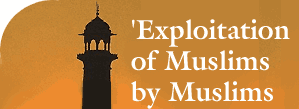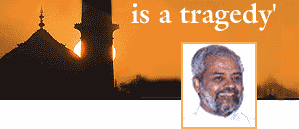

Reverend Valson Thampu, 52, is a Christian priest who teaches English literature at St Stephen's College in Delhi.
Along with Gandhian Nirmala Deshpande and Swami Agnivesh, he formed a voluntary group, the Adhyatmak Jagran Manch, in April to promote religious harmony. An active participant in public life for the last three years, he is also a former member of the Delhi Minorities Commission.
Thampu spoke to Ehtasham Khan on the current controversy behind the proposed Uniform Civil Code.
How do you see the recent Supreme Court judgment in which the Chief Justice of India has advocated the implementation of a Uniform Civil Code?
There is nothing surprising about the Supreme Court and Chief Justice V N Khare making this observation.
The issue of the UCC has been hanging for a period of time. There have been sporadic references to that in the Supreme Court. For example, in the Shah Bano case (in 1986), the judge made a far more impassioned plea to the government than Justice Khare has done.
So in a sense there is nothing surprising about it. It is in Article 44 of the Constitution and whatever is mandated in the Constitution must be realised sooner or later. So to that extent it is appropriate.
But critics say this is not the right time to make such observations.
Several people argue that the time is not right. I want to be realistic about it and say that the climate favourable for the UCC was better 10 years ago than now. Therefore, it doesn't seem to be realistic or sensible to wait for a time when everything becomes favourable and then address the question of the UCC. That time will never come.
Therefore, I would want to argue that every citizen must accept whatever is mandated in the Constitution. Unfortunately, the reluctance to accept the Constitution, particularly the basic values of the Constitution, is increasing. At all levels and in all corners. Many people are increasingly finding the Constitution a stumbling block. I am unhappy about it.
I am willing to compromise my rights, my particular tastes, my unique interest for the sake of realising the Constitution of my country. Because that is the secular creed and manifesto that I have.
So you support the idea of the UCC. But many supporters of the UCC are wary because the Bharatiya Janata Party is in power.
I know there are problems. But I am not sure if we wait for another 50 years, the circumstances would be favourable. I also think, unfortunately, the communal atmosphere in India is not only vitiating but is deliberately vitiated by certain forces that are out to derive political benefit out of it.
Who are these forces?
Obviously everybody knows the Sangh Parivar. But I must tell you, they by themselves would not have caused so much harm. Unfortunately, in this destructive enterprise, they have been aided and abetted unwittingly by the orthodox and fundamentalist factions in the Muslim community and in other minority communities to a lesser extent.
Why are you only talking about the Muslims?
Politically, no other community matters as much as the Muslims.
Therefore, my plea to the Muslim religious and political leadership would be to recognise the crucial and historic importance of the Muslim community as a major minority community, and think progressively so that they do not unwittingly aid and abet Hindu fundamentalist forces and give them legitimacy and acceptance in the minds of the people.
Minorities are feeling insecure and the idea of the UCC will further increase the anxiety of the minorities. I accept the fact that this country will have the UCC one day or the other. It is already over delayed.
How do you see the government's role in the implementation of the UCC?
If you read Article 44 of the Constitution it says the State shall endeavour to have the UCC. Built into this Article is the recognition of the fact that this is not any easy thing to do. Endeavour means there is a process to be undertaken. It cannot be put into effect all of a sudden. We have to work towards that.
Sadly, in spite of the ideological support extended by the BJP for the UCC, no worthwhile effort was made to prepare the way for it. In fact, the proponents of the UCC in the political context were the people who destroyed the way, blocked the way -- emotionally and sadistically.
They handled it in such a way that it would become unacceptable to any sensible person. So I feel lost in the process. I want to have the UCC.
Do you think India's plural and multi-religious society really needs the UCC?
As a Christian priest I feel that every religious community must accept the basic discipline of living in a secular and religiously plural society. I cannot impose the uniqueness of my faith on others. If something is strange about my faith, I will keep it to my faith. I will not bring it into public life.
But for any change to become acceptable some groundwork needs to be done. If we float a new product in the market, we first advertise about it. Political parties announce populist measures a year ahead of the elections.
I have serious doubts if the BJP is really committed about the implementation of the UCC. It is using the UCC as an instrument of communal intimidation. Because the Sangh Parivar's ideology is dismissive of integration. Their ideology is of homogenisation and assimilation which is the opposite of integration.
They want uniformity. But the framers of the Indian Constitution were not for uniformity. Otherwise, they have not had clauses to preserve the diversity of the country. Our Constitution has an integrative vision. We are different, but not opposed to each other.
The irony of Indian political history is that those who championed the cause of the UCC destroyed the prospects of the UCC by pushing Muslims to their back.
How can the UCC be implemented?
I suggest that a concerted and well-orchestrated effort should be made in order to prepare the way for the implementation of the UCC.
This includes a clear attempt to rein in all communal forces that are now busy vitiating the communal environment in India. Second, there must be emphatic commitment to rule of law. Equality before law must be guaranteed which unfortunately is not. That is where Gujarat's Best Bakery case is very symbolic. The judge himself expressed helplessness. If you will not be able to deliver justice, how will you be able to build confidence in the people?
Third, the UCC must be drafted. But in drafting the UCC, care must be taken to ensure that this code is drafted from the perspective of integration and not assimilation because there is possibility of a Hindu code as a basis for the UCC. The UCC has to be a combination of all enlightened laws. So they (the Hindu groups) would say these are the most enlightened laws. How will you counter that?
A Common Civil and Secular Code
What should the UCC be like?
Something other than an explicit religious code must become the basis of the UCC. I would suggest values and provisions embedded in the international instruments on human rights. Any provision that is disruptive and clashes with the fundamental values in the Constitution must not be included in the UCC.
This work needs to begin now. I would appeal to Muslim leaders to see that habitual opposition to progressive measures like this would be counter productive. Unfortunately, the Muslim leadership has projected the Muslim personal law as Muslim identity -- that is terribly destructive of its image in public.
When people look at the Muslim personal law, they just see few things. Polygamy, triple talaaq and not giving maintenance to divorced women.
According to government statistics, only 5.2 percent Muslim men are polygamous while 5.8 percent Hindus, 9 per cent Scheduled Caste and 14 per cent tribals have more than one wife.
To say that Muslim identity depends on these is to present a horrible picture of Islam. Islam is a religion of justice. Then how can discriminatory provisions exist in Islam?
People think only Muslims want polygamy. Why? Because they are most vocal about it. They are ready to go and fight about it on the streets even though they don't practice it. This is absurd.
Enlightened Muslims should come up and speak. They should move with the forces of progress and give up all provisions in the personal laws that are anti-modern and unjust.
If you don't treat your men with justice, how do you expect others to do justice with you? Both Christians and Muslims honestly do not believe in secularism. But all of us want the benefit of secularism.
Religious communities in a multi-religious secular democracy should rethink how much of their uniqueness should be displayed in public.
Each time an initiative for reform comes, some text from the Quran or Bible is taken out, some customs are quoted and said this cannot be done. This is against our religion.
People say it is an issue of their religious sentiment.
I am a priest and I happy to say that if any passage or instruction in the Bible violates the Constitution then I will not bring it into public life.
I appeal to the Muslim leaders to volunteer to exclude from their argument those points they have used in the past.
Eighty percent Muslim women are not happy (with the Muslim personal law). The orthodox Muslim leadership today has no credibility because the entire nation knows Muslim women are not happy. The sword of divorce hangs on them and also the sword of poverty after divorce because there is no maintenance.
There must be urgent reform in Muslim personal law and before the government does it, the Muslim leadership should (bring it about).
What are the problems with Christian personal law?
The only problem is the adoption law. We don't have adoption rights. We are still governed by guardianship laws of 1890. This needs to be revised. We want same standard for all.
Do you think religious identity is not important?
Socio-economic identity is far more important in defining your religious identity positively. Look at the Parsi community.
These people (Muslim leaders) who do it to their own people, they are safe. In Gujarat, Abdullah Bukhari (Imam of Delhi's Jama Masjid) will not be killed. I saw a Muslim woman who was raped by 16 men. After the rape, they beat her and broke her legs and dumped her thinking she was dead.
That will not happen to Abdullah Bukhari. Ordinary Muslims are victimised. My heart goes for this community. Exploitation of Muslims by Muslims is the greatest tragedy of this community.
How should the procedure of implementing the UCC begin?
No political party should be involved. The Supreme Court has suggested a roadmap for this. The Law Commission in consultation with the National Minorities Commission should prepare a draft (UCC). This (draft) should be open for discussion across the country.
Do we need the Uniform Civil Code?